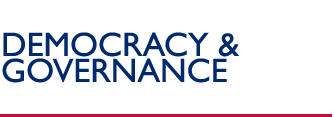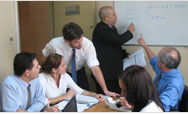 |
Occasional Papers Series
The USAID Office of Democracy and Governance Occasional Papers Series was launched in October 2000. The series includes publications intended principally for USAID personnel; however, all persons interested in the topic may benefit from the series. The Occasional Papers Series is designed to bring together DG Office-produced or –funded publications in a coherent series that upholds the high standards and quality established by the DG Office’s Technical Publication Series. Authors of individual publications may be USAID officials and/or other individuals from the public and private sector.
 Hard copies of these publications can be ordered from USAID's Development Experience Clearinghouse at docorder@dec.cdie.org. These documents are in PDF format and require the Adobe Acrobat Reader or PDFViewer plugin for Netscape to be
viewed. This software is available for free download from Adobe. Hard copies of these publications can be ordered from USAID's Development Experience Clearinghouse at docorder@dec.cdie.org. These documents are in PDF format and require the Adobe Acrobat Reader or PDFViewer plugin for Netscape to be
viewed. This software is available for free download from Adobe.
Achievements in Building and Maintaining
the Rule of Law:
MSI’s Studies in LAC, E&E, AFR, and ANE
(PN-ACR-220), November 2002
This Occasional Paper was commissioned by the rule of law division of the Office of Democracy and Governance, but Management Systems International (MSI) conducted the research, field study, and drafting. USAID's publication of this report has been undertaken so that its findings reach a wider audience; its content has not substantively changed from the document originally prepared by MSI.
The objective of the study was to take a step back, and look at the higher level, cumulative impacts that can only be measured over a longer time horizon, in as unbiased a manner as possible. The study looked at such issues as whether military officers have been prosecuted in countries where such prosecutions were inconceivable 20 years ago, and whether courts have been selected in a transparent, non-political fashion where that would have been equally inconceivable 20 or even ten years ago. This paper provides a comprehensive collection of the achievements that were found to be reasonably linked to USAID rule of law programs over their history, on a country-by-country and regional basis.
Approaching Education from a Good Governance Perspective: USAID Resource Guide for Joint DG/Education Programs
(PN-ACR-222), August 2003
This resource guide is a joint effort of USAID’s Office of Democracy and Governance and Office of Education, responding to the need to promote greater policy and program linkages between the Agency’s democracy and governance (DG) and education sectors. The specific goals of this DG and education resource guide are to raise awareness among education sector professionals at USAID about the role of the DG sector in shaping education policies and programs; to raise awareness among USAID DG professionals about education as an important DG issue; and to provide frameworks and best practice examples to help guide joint programming among USAID education and DG staff.
Civil Society Groups And Political Parties: Supporting Constructive Relationships
(PN-ACU-631), March 2004
Many working in the United States on democracy assistance tend to consider civil society organizations (CSOs) and political parties, and support for them, separately. But reality remains much more complex, and the nature of existing relationships in the countries we work in and the effects of democracy assistance on those relationships matter for our larger democracy and governance (DG) goals. They, therefore, deserve explicit examination. This paper deals with two broad sets of questions. First, what do we think we should be aiming for at the systemic level, in terms of the relationship between civil society and political parties? Second, in a given setting, what kinds of relationships, at the micro level (among individual organizations), can contribute to democratization?
The Enabling Environment for Free and Independent Media:
Contribution to Transparent and Accountable Governance
(PN-ACM-006), January 2002
This document identifies the main components of the legal environment that enable media to advance
democratic goals. Interactions between the legal and media sectors significantly shape the degree of
professional independence enjoyed by newspapers and broadcasters, allowing media to provide more accurate
information to citizens and elites alike. Thus, a basic understanding of the most pertinent laws, enforcement
and judicial practices, administrative processes, ownership structures, and other aspects of the enabling
environment can help in the design of more effective strategies for developing free media. This, in turn,
reinforces more broadly the effectiveness of democratic institutions.
Mitigating Abusive Labor Conditions: Contemporary Strategies and Lessons Learned
(PN-ACU-630), November 2003
This Occasional Paper responds to a growing concern in the United States, which has given life to a number of diverse and experimental approaches to mitigate abusive labor conditions, often referred to as "sweatshops," in the apparel industry both in the United States and overseas. This paper describes a sample of the existing anti-sweatshop programs, assesses the strengths and weaknesses of each, and provides a set of recommendations for future directions in combating sweatshops.
Participation, Consultation, and Economic Reform in Africa: Economic Fora and the EG-DG Nexus
(PN-ACM-002), October 2001
This occasional paper examines four economic forum experiments in Africa: the Ugandan National Forum, the National Economic Forum (Ghana), the National Economic Development and Labor Council (South Africa), and the Tripartite Negotiating Forum and the National Economic Consultative Forum in Zimbabwe. Through these four examples, the paper will explore the connections between economic growth and development, and USAID's efforts to pursue those connections.
Understanding Representation: Implications for Legislative Strengthening
(PN-ACH-303), November 2000
This short paper presents highlights from the Second International Conference on Legislative Strengthening. It addresses a number of the dominant themes and issues that emerged from both presenters and conference participants. It discusses (a) how legislatures can better reach out to constituents, civil society, and marginalized groups, (b) the manner in which globalization has influence legislatures and legislative development, (c) a range of donor and service provider considerations, and (d) alternative approaches to legislative programming.
Back to Top ^
|


